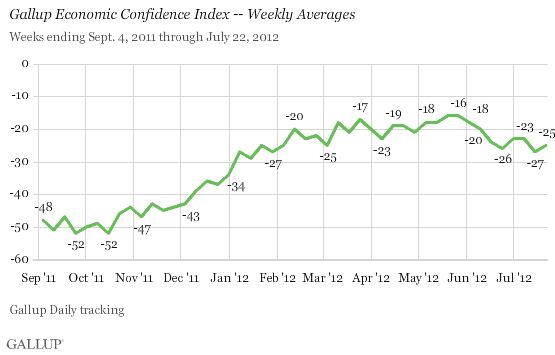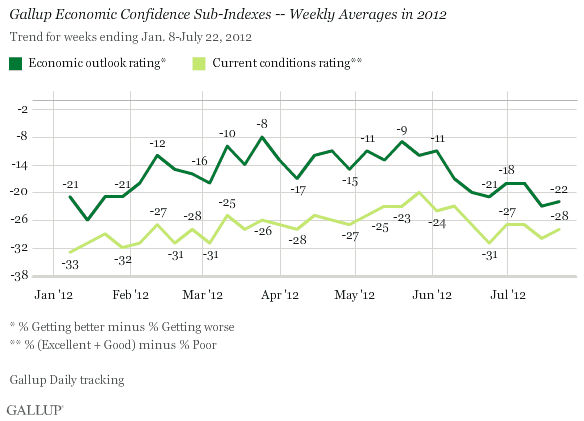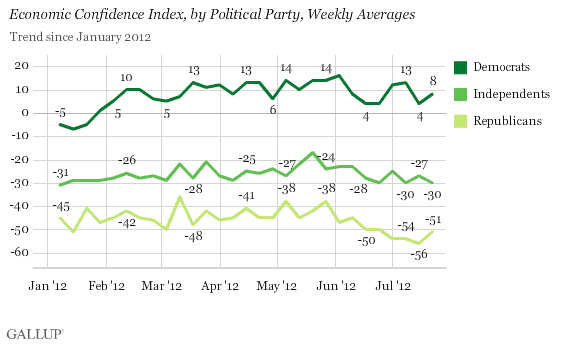WASHINGTON, D.C. -- U.S. economic confidence rose slightly to -25 for the week ending July 22, from -27 the previous week, meaning Americans have a somewhat more positive outlook. Since mid-June, confidence has fallen into a narrow range between -23 and -27, after Gallup registered more positive readings in April, May, and early June. Nevertheless, Americans are more upbeat about the economy now than they were in late 2011 and early 2012.

Gallup's Economic Confidence Index consists of two measures -- one assessing current economic conditions and the other assessing the nation's economic outlook. Americans' economic outlook and views of current economic conditions changed little last week. The -22 economic outlook rating reflects a one-percentage-point increase over the previous week, with 36% of Americans saying the economy is getting better and 58% saying it is getting worse. Fourteen percent of Americans say the economy is excellent or good, while 42% consider it poor, resulting in a -28 current conditions rating.

Confidence improved among both Democrats and Republicans last week, while perceptions among independents declined. The increase among Republicans marks the first time in six weeks that confidence improved among this group.
Still, economic perceptions remain sharply divided among party lines, with Democrats having a net positive view of the economy and Republicans a highly negative one.

Implications
Although Americans' economic confidence improved slightly last week, it remains to be seen if it can maintain positive momentum in the weeks to come, and climb any higher than the range near -25 at which it has been hovering for the last month. The nation's unemployment rate will likely be key to improving economic confidence. However, Gallup's employment data show little has improved on that front in early July, suggesting the U.S. Bureau of Labor Statistics will likely report another month of no improvement when it releases its jobs report in early August. Thus, unless other economic measures show definite signs of an improving economy, it is unlikely that Americans' confidence in the economy will improve much in the short term.
Gallup.com reports results from these indexes in daily, weekly, and monthly averages and in Gallup.com stories. Complete trend data are always available to view and export in the following charts:
Daily: Employment, Economic Confidence, Job Creation, Consumer Spending
Weekly: Employment, Economic Confidence, Job Creation, Consumer Spending
Read more about Gallup's economic measures.
View our economic release schedule.
Survey Methods
Results are based on telephone interviews conducted as part of Gallup Daily tracking from July 16-22, 2012, with a random sample of 3,367 adults, aged 18 and older, living in all 50 U.S. states and the District of Columbia, selected using random-digit-dial sampling.
For results based on the total sample of national adults, one can say with 95% confidence that the maximum margin of sampling error is ±4 percentage points.
Interviews are conducted with respondents on landline telephones and cellular phones, with interviews conducted in Spanish for respondents who are primarily Spanish-speaking. Each sample includes a minimum quota of 400 cell phone respondents and 600 landline respondents per 1,000 national adults, with additional minimum quotas among landline respondents by region. Landline telephone numbers are chosen at random among listed telephone numbers. Cell phone numbers are selected using random-digit-dial methods. Landline respondents are chosen at random within each household on the basis of which member had the most recent birthday.
Samples are weighted by gender, age, race, Hispanic ethnicity, education, region, adults in the household, and phone status (cell phone only/landline only/both, cell phone mostly, and having an unlisted landline number). Demographic weighting targets are based on the March 2011 Current Population Survey figures for the aged 18 and older non-institutionalized population living in U.S. telephone households. All reported margins of sampling error include the computed design effects for weighting and sample design.
In addition to sampling error, question wording and practical difficulties in conducting surveys can introduce error or bias into the findings of public opinion polls.
For more details on Gallup's polling methodology, visit www.gallup.com.
